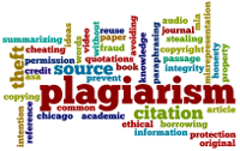|
Plagiarism is the representation of another person's original work, ideas, thoughts, and words as one's own without crediting the source. It is an act of fraud whether done deliberately or unknowingly. If your research paper or thesis contains information from other sources, it is very important to mention the source of information in your paper by using internal citation. Failing to do so properly may catch you into the plagiarism trap. A person can never develop good writing skills if he or she does not try to create their own piece of work. A person's career or reputation is very valuable to lose over a moment work of carelessness and weakness. You should ensure that your paper is original or well cited before handing it for publication.
It is very simple to enclose more and more information in your research paper, but it is very difficult to avoid plagiarism. Plagiarism is a major problem even if it is done unintentionally. You can easily avoid plagiarism by following some simple steps.
Citing sources
Reference made to the source you have consulted and mentioned in your work while wring a research paper is citation. It is one of the effective methods to avoid the allegations of plagiarism. It also shows that you have done thorough study on the literature of your topic of research therefore increasing the credibility of your work. It is the proper way of including sources in your research paper at the same time avoiding any disputes.
Avoiding self-plagiarism
If you are using the information you have used earlier yourself in your own articles, research papers etc. it still needs to be cited to avoid self-plagiarism.
Paraphrasing
Restating someone else's ideas or thoughts in your own words is called paraphrasing. If you have found relevant information which you want to include in your research you should put it in your own words without changing the content. Changing one or two words of the original sentence will not make it a paraphrase. Also the paraphrase still needs to be cited as only the sentence structure is changed but not the ideas.
Quoting
When you are using a quote you should not try to change it as no one wants to be misquoted. Quoting should be done perfectly to avoid issues.
Referencing
You should always include a reference page in your work to avoid plagiarism. Follow the proper format of the reference page and try to mention all the sources you have used in your paper.
The source from which you are using information must be acknowledged properly. If you are unable to cite the sources properly or not sure about something you should always consult an expert before submitting your work. It is very important to adopt the habit of citing sources.
If you don't cite the source of an argument or statement made in your paper, it may raise concerns about the integrity of your paper. It also brings into readers notice that you have not done thorough review or research of the literature of the research problem of your thesis. It is very helpful to use a plagiarism checker to check for it and ensure that your work is original and well cited. Authors must adhere to the originality of their research work for getting their work easily published and recognised.
|

|